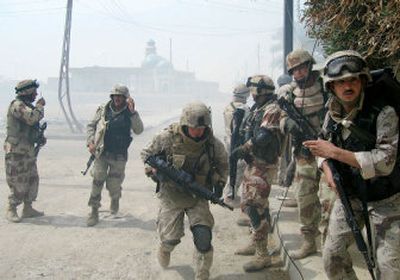New Iraqi prime minister chosen

BAGHDAD, Iraq – With a hint of hope and more than a bit of relief, Iraq’s parliament finally met Saturday to endorse a deal among rival factions to name a prime minister and get their first permanent government of the post-Saddam Hussein era off the ground.
The 266 legislators who met in a sweltering Baghdad convention center ended a four-month wait that followed national elections in December. They distributed top political jobs, including presidency and the speaker of parliament, among Shiite, Sunni and Kurdish parties.
Incumbent President Jalal Talabani, a Kurd who was returned to office, then nominated Jawad al-Maliki, a Shiite political activist and former exile, as prime minister.
“We are working for the sake of a national unity government,” said al-Maliki, who emerged as the likely choice Friday after his Dawa party ally Ibrahim al-Jaafari stepped aside. “All the different groups that are in government must have the right to participate in making decisions.”
Al-Maliki now has 30 days to form a Cabinet that meets the parliament’s approval.
The breakthrough produced celebratory gunfire and fireworks in parts of the capital. Iraqis collectively exhaled, comforted that the wait for a stable political leadership may be ending.
The political vacuum has contributed to a sharp escalation in targeted assassinations and intimidation across the country, pushing many Iraqis deeper into the embrace of their own religious or ethnic communities. Many of those with means have left the country altogether.
On a visit to California, President Bush said that the decisions represented an important milestone for Iraqis.
The new leadership represents Iraq’s diversity, Bush said, adding: “The Iraqi people have rejected the terrorists’ efforts to divide them, and they have chosen the path of unity for their free nation.”
Among the challenges facing al-Maliki are appeasing competing factions that covet key positions such as those directing the country’s security apparatus and guarding its wealth.
He must crack down on rampant corruption, restore neglected services and crumbling infrastructure and find a way to restart an economy that leaves thousands of young men unemployed.
The new government will also have to find a formula to share the country’s oil wealth which sates the desire of Kurds and Shiites in oil-rich areas to move further away from central government’s authority.
But above all, Iraq’s leaders must regain the trust of a traumatized population that has turned out to vote three times since the 2003 U.S.-led invasion and now blames those same politicians they elected for failing to steady the country.
Al-Maliki’s every decision will be fraught with political risk, carrying the potential to alienate key constituencies – some heavily armed. That challenge was underscored by his first declaration after being named prime minister, in which he insisted that militias be incorporated into Iraq’s authorized security forces. Many Iraqis view such militias as a primary cause for the instability rocking the nation. But they also make up much of the new premier’s political base. “Arms should be in the hand of the government,” al-Maliki said.
Politicians taking the podium Saturday under the gaze of a national TV audience pledged to serve all Iraqis rather than emphasizing their sectarian or ethnic interests.
“Iraq is made up of Kurds, Sunni, Shiites and Turkmen,” Mahmoud al-Mashhadani, a Sunni Arab newly elected speaker of the parliament, said in an emotional speech that recounted his years of jail, exile and suffering under Saddam’s dictatorship. “We must face the reality that there is sectarian tension. We must eliminate it. And we will, during the next four years.”